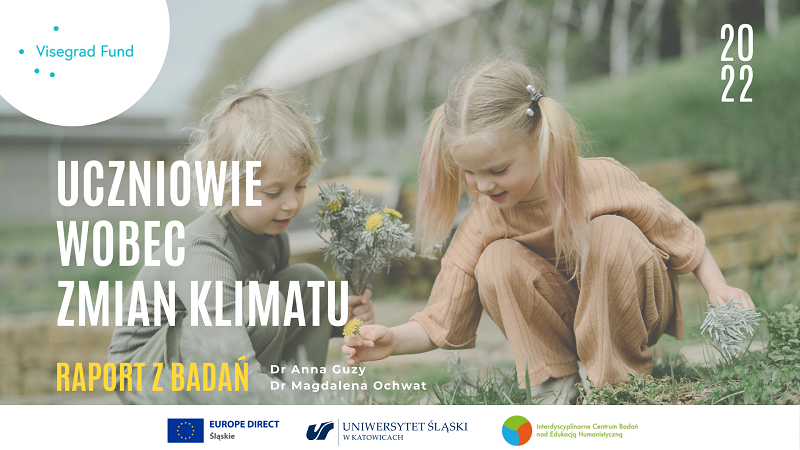Is global warming compounded by greenhouse gas emissions a fact? Are people responsible for climate change? These and a number of other questions related to global changes in the environment were answered by students participating in the study entitled “Students on climate changes”. The study was conducted by Anna Guzy, PhD, and Magdalena Ochwat, PhD, from the Interdisciplinary Centre for Research on Humanistic Education at the University of Silesia in Katowice.
The questionnaires have been completed by students aged 10–19, mainly from the Silesian Voivodeship. Most of the questionnaires have been completed by students aged 15-18. In total, 2,181 students participated in the study. The data was collected from November to December 2021.
The aim of the study was to find out students’ attitudes towards the problem of the climate crisis and their knowledge in this field. They could also express their opinion on the quality and necessity of implementing climate education in schools, including Polish language lessons.
Analyses conducted for several years show that the environmental awareness of students is growing, although it is still not deeply established. The study proves that young people have a less developed environmental awareness than adults in general, and, importantly, than the teachers of Polish language teachers covered by the study in 2021.
For nearly 70% of students climate change is important, while as many as 10% consider it unimportant, and 20% have no opinion. According to the researchers, this is the result of the lack of systemic climate education in schools, a deficit of environmental reflection in socio-political life, neglect of teaching about climate destabilisation, and contradictory messages appearing here and there, both in the Polish media and in social media. What is more, the majority of the surveyed students (82%) do not undertake any additional activities in the field of education for the climate – they do not know the texts of culture (only 8% know them) and do not watch films (only 31% do) on the climate crisis. Additional activities in the field of broadening and deepening climate education are taken by 17% of the respondents.
The students who took part in the survey get inspiration on the climate from various sources: the environment and the world closest to them, i.e. from social media, television, as well as from influencers. The respondents also mentioned their siblings, parents, grandparents, friends, environmental organisations, music bands and singers.
Nearly 60% of respondents believe that climate education is not satisfactory. Only 37.65% of students indicate that the lessons deal with problems related to climate change. This is rather not conducive to building cross-sectional knowledge on, inter alia, global warming. Most often, as indicated by the respondents, climate themes appear within the following school subjects: geography, biology, English, Polish, and civics. Students highly appreciate lessons which allow them to engage in discussion and explain the content in depth. They value the instructor’s involvement, discussions and debates – forms that stimulate them to think and reflect critically. Lessons where teachers use only the passive methods of teaching (lectures and work with the textbook) were assessed much worse.
In the students’ opinion, education for the climate should be: practical (joint actions, such as cleaning the planet, outdoor activities, Oxford debates), conducted by professionals (experts and people with specialist education), and carried out with passion, which will motivate people to action.
The presented results of the survey conducted among students show the need for systemic changes in education, which everyone is talking about and other countries have been practicing for a long time. There is an urgent need to change the core curriculum, textbooks and university education of teachers. The tardiness in taking up these challenges may have irreversible consequences for the next generations of Earthlings.
The research was carried out as part of the Visegrad project entitled “V4 Humanistic Education for Climate. Diagnoses – good practices – recommendations”, implemented by the Interdisciplinary Centre for Research on Humanistic Education of the University of Silesia in Katowice in cooperation with EUROPE DIRECT Silesia. The Report “Students on climate change” in a PDF document can be downloaded HERE.
photo: Markus Spiske | Unsplash







